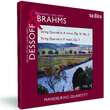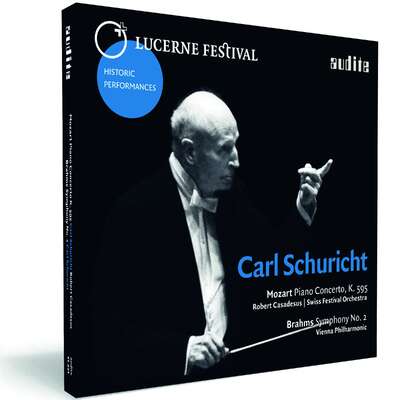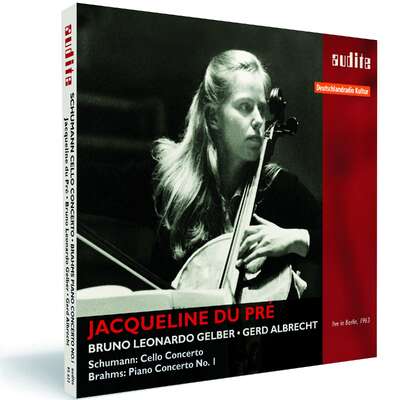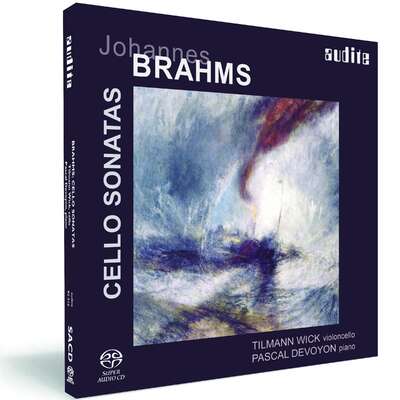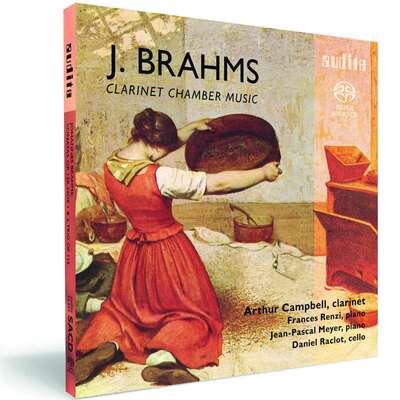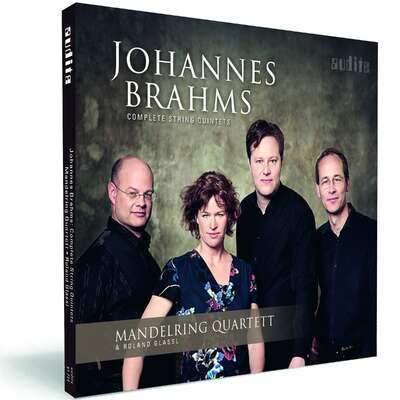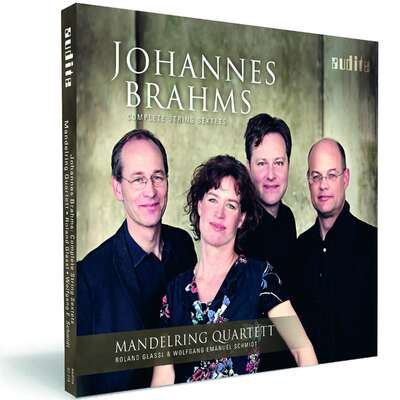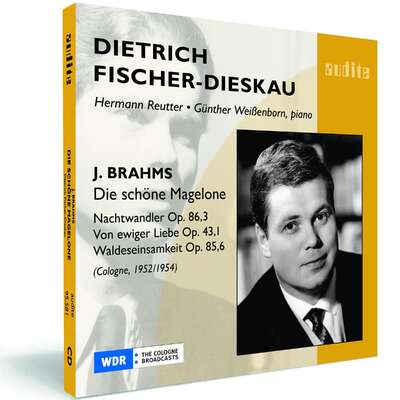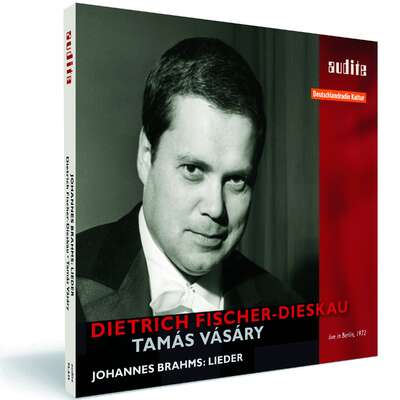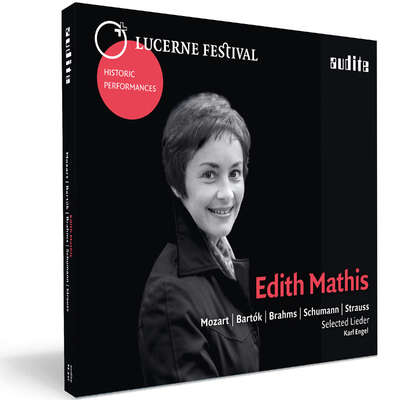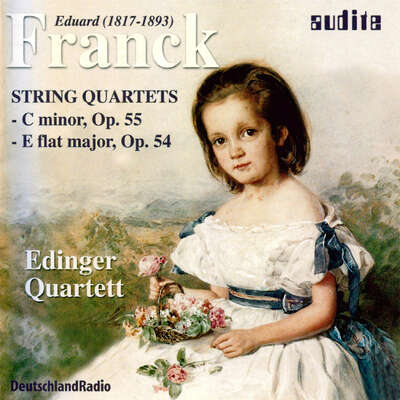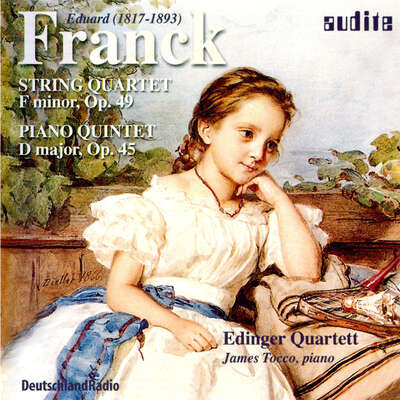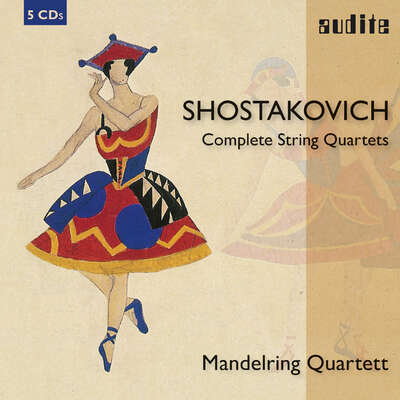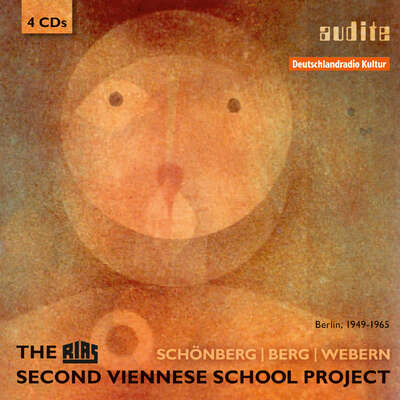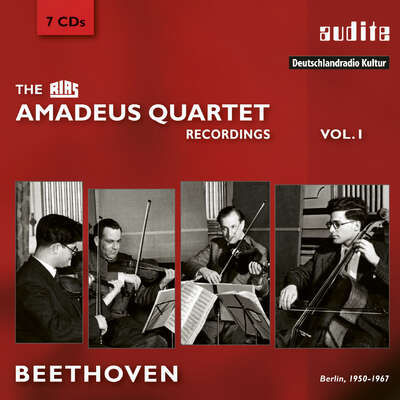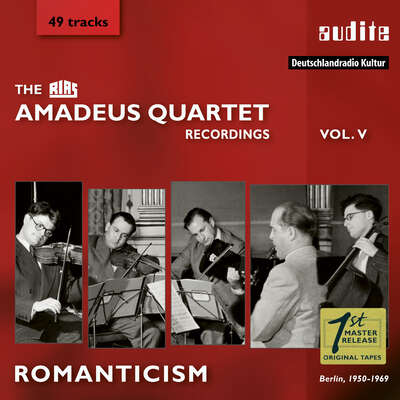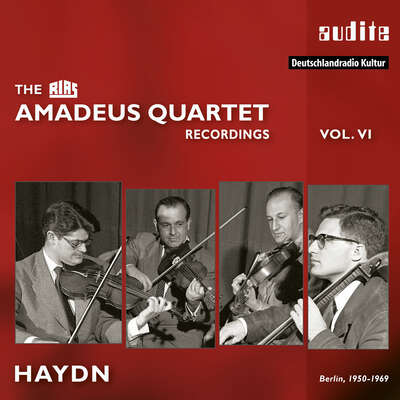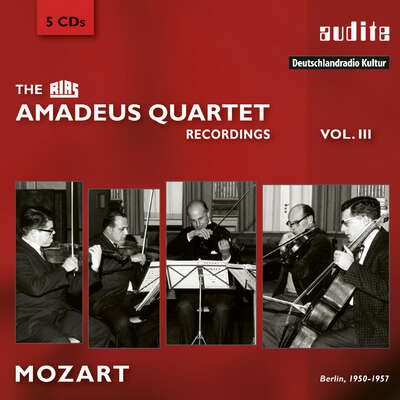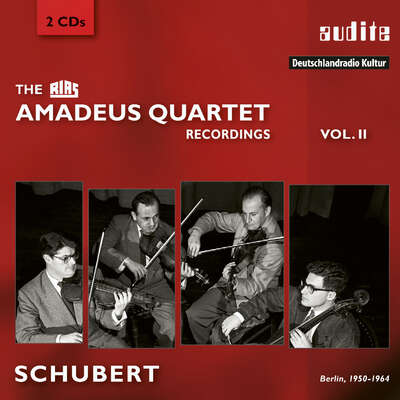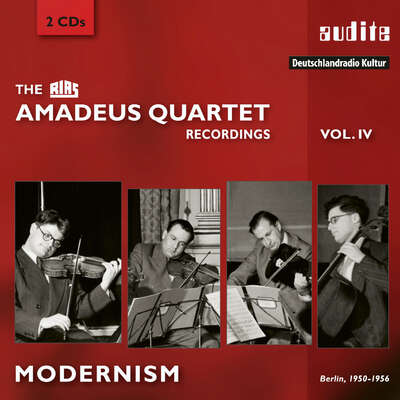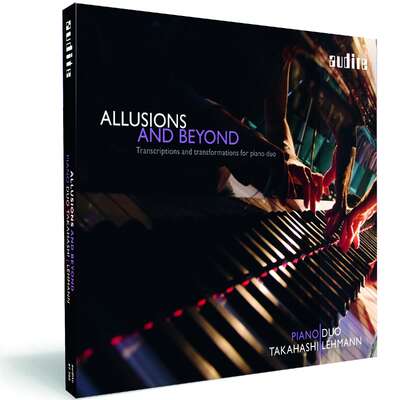
“Thank you very much indeed for the Quartet which is now smiling at me in such a friendly manner, like the first time.” (Brahms to Dessoff) Felix Otto Dessoff (1835-1892) was already active as a chapel-master at the age of 19 and could look already back over a remarkable career when he...more
"The quartet contains rhythmic, harmonic and performing idiosyncrasies reminiscent of Brahms in places; it is full of wit and playful joy, convincing the listener through its original, direct charm. The work is exuberantly performed on this third CD of the series ‘Brahms and his Contemporaries’ by the acclaimed Mandelring Quartett, together with Brahms’s innovative string quartet in A minor." (www.new-classics.co.uk)
Details
| String Quartets by Brahms (Op. 51, No. 2) & Dessoff (Op. 7) | |
| article number: | 97.505 |
|---|---|
| EAN barcode: | 4022143975058 |
| price group: | BCA |
| release date: | 22. August 2007 |
| total time: | 60 min. |
Informationen
“Thank you very much indeed for the Quartet which is now smiling at me in such a friendly manner, like the first time.” (Brahms to Dessoff)
Felix Otto Dessoff (1835-1892) was already active as a chapel-master at the age of 19 and could look already back over a remarkable career when he was appointed to the Court Opera in Vienna in 1860. This is where the paths of Dessoff and Brahms crossed for the fi rst time, especially since the conductor Dessoff was strongly committed to Brahms’s works. Their mutual recognition and appreciation found expression in the premiere of Brahms’s First Symphony in Karlsruhe, for example, with which Brahms entrusted Dessoff. The dedication of the present String Quartet of Dessoff to Brahms also reveals the bond between the two composers.
Dessoff composed intensively during his period in Karlsruhe. Like Brahms, he had doubts about the value of his compositions. He therefore sent his F-major String Quartet to Brahms for the latter’s appraisal, only publishing it after he was sure of Brahms’s approval. The Quartet contains rhythmic, harmonic and performing idiosyncrasies reminiscent of Brahms in places; it is full of wit and playful joy, convincing the listener through its original, direct charm.
Brahms, on the other hand – the classicist and academician – does not exclusively reveal himself as the preserver of the string quartet tradition in the work recorded here, but also as an innovator of musical language. Through the formation of motifs, the logic and economy of phrases and the sometimes hidden beauty of details, Brahms understands how to do justice to the demanding genre of chamber music and, moreover, to set new standards for the genre of the string quartet.
The present CD follows as the third part of the series “Brahms and his Contemporaries”. With its interpretation, the Mandelring Quartet lends a thrillingly musical power of conviction to both string quartets.
Reviews
classiqueinfo-disque.com | mardi 9 décembre 2008 | Vincent Haegele | December 9, 2008 Brahms et quelques consorts
Brahms n’a pas été un compositeur de quatuors à cordes commeMehr lesen
Fanfare | Issue 31:5 (May/June 2008) | Jerry Dubins | May 1, 2008
Though the Brahms quartet leads off the program here, it’s the quartet by Felix Otto Dessoff (1835–1892) that’s the more noteworthy item. As youMehr lesen
Audite and the Mandelring Quartet (Sebastian Schmidt and Nanette Schmidt, violins; Michael Scheitzbach, viola; and Bernhard Schmidt, cello) have released two companion discs to this one, pairing each of Brahms’s other two string quartets with a quartet by a near contemporary. Brahms’s C-Minor Quartet is paired with a quartet by Friedrich Gernsheim, and the B♭-Major Quartet is paired with a quartet by Heinrich von Herzogenberg.
My previous encounter with the Mandelring came with four cpo CDs of chamber music by Georges Onslow, in which repertoire I thought they were quite good. The field for Brahms’s quartets, however, is far more crowded; and the present release does not have timing on its side, having arrived not long after the Brahms set with the Emerson Quartet. While the A-Minor Quartet is not as tightly wound and aggressive as its sibling C-Minor Quartet, there is still a nervous unease to it that the Mandelring’s more laid-back reading seems to miss. The playing is beautiful, but it’s a bit too relaxed for my taste and lacking the edginess that the Emerson brings to the score.
For the Dessoff, choice is extremely limited, the current recording being the only one listed. Experience has taught me, however, to make a more thorough check before declaring a recording to be the first or only one in existence. And sure enough, a quick perusal of my own collection turned up a 1983 Antes CD (319023) of the piece played by the Bartók Quartet. It has the advantage of being coupled with a 1986 performance of Dessoff’s even more rarely heard 1880 G-Major String Quintet. In a case of reverse influence, it may be that Brahms’s own two string quintets may have been inspired by Dessoff’s earlier written work, though Brahms chose to follow Mozart’s model with two violas, while Dessoff chose Schubert’s model with two cellos. Whether the Antes disc is still available or not, I can’t say.
Dessoff’s F-Major Quartet could not be mistaken for Brahms, no how, no way. The harmonic language is similar, but the melodic profile doesn’t match, the texture is lighter, and the overall mood is gay—more reminiscent of Johann Strauss’s Vienna than Brahms’s. Listen, for example, to the Poco andantino that serves as the quartet’s Scherzo movement. Most delightful is the last movement, Allegro con brio, a joyous, jocular affair that dashes breathlessly here and there like a busy aunt arranging the table decorations and everything else for a wedding reception. It’s a lightweight, playful piece that makes a fine foil to Brahms’s much darker and heavy-hearted work.
Playing and recording are excellent. Recommended.
American Record Guide | May/June 2008 | Fine | May 1, 2008
You will be relieved to see your name on the title page of the quartet preserved for posterity. When people have forgotten your German Requiem, peopleMehr lesen
The above quotation is from Felix Otto Dessoff (1835-1892), who is best known as the conductor who led the first performance of Brahms's First Symphony. Dessoff was an excellent composer who wrote only a small amount of music. It seems that he stopped composing when his conducting career demanded all of his time. He dedicated his only string quartet to Brahms, with whom he had a close friendship. He uses harmonic language that is similar to the Brahms but uses it differently. This is not a work that copies Brahms, but it shows similar influences. One influence makes itself very clear: II bears homage to II of Beethoven's Opus 59:3 (Quartet 9).
It is a shame that Dessoff only wrote one string quartet, but this is a real gem, and it holds its own next to Brahms. I find it more enjoyable to listen to than the intense Brahms A-minor (No. 2). This is part of an eye-and-ear-opening set of recordings by the Mandelring Quartet that pair Brahms's three quartets with quartets by three of his close friends. The playing by this quartet, that has siblings as three of its members, is excellent.
CD Compact | Número 218, Marzo 2008 | Emili Blasco | March 1, 2008
Audite presenta dos discos con el Cuarteto Manderling como protagonistaMehr lesen
www.musicweb-international.com | February 2008 | Jens F. Laurson | February 25, 2008
Worth a strong recommendation for Brahms A minor alone and the Dessoff is immediately and lastingly enjoyable ...<br /> <br /> I am, reluctantly, convinced ofMehr lesen
I am, reluctantly, convinced of the merits of the Brahms String Quartet in A minor op.51, no.2. I just have yet to be touched, charmed or moved by it. I’ve tried to let the Emerson and the Takács Quartets do that for me, but they only offered excellence, not grit or inescapable passion. Three’s a charm though, and the third recording of the A minor quartet I’ve come across this year may have done it for me.
When Brahms develops a 35 minute quartet out of just a few basic musical building blocks, the result is - or can be - an expressive stringency of which Hugo Wolf declared Brahms the “undisputed master of composing without ideas”. Even Britten quipped that it wasn’t bad Brahms that he minded, but good Brahms that he couldn’t stand.
Usually I’d snicker with delighted, if embarrassed agreement – at least where Brahms’ string quartets are concerned. But the combination of cohesion and energy of the Mandelring Quartett (who played Brahms at the Library of Congress in 2006) makes for an unusually compelling, indeed spellbinding performance. Brahms, for once, seems successfully to reach the pinnacle of a composer’s ambition that is the string quartet with op.51/2. This is a string quartet that fascinated Schoenberg for its economy of means and made him famously declare Brahms ‘a progressive’. I will have to explore the other two volumes of their Brahms traversal – made only more attractive by their inclusion of string quartets of (forgotten) contemporaries of Brahms. If ever issued as a set – hopefully retaining the ‘fillers’ – it might well vie for the reference recording spot with the Alban Berg Quartet’s EMI recording.
This disc is worth a strong recommendation for the Brahms A minor alone. But there is more. Rather than point out that the ‘filler’ on the Brahms is “this neat, unknown F.O. Dessoff”, the performance and the quartet deserve to be mentioned, praised, and recommended separately. In fact, I’d give this disc the same two thumbs up even if it only included either of the two quartets.
That’s not only because the playing is outstanding but also because Dessoff’s op.7 is much more than just an afterthought to the Brahms quartet. It’s a wonderful work that deserves to be smack-dab in the middle of the string quartet repertoire of more groups than just the Mandelring. Brahms himself, a friend of Dessoff’s, found to have “such an unassuming face that one hardly dare praise it out loud … It would greatly please me to have my name printed on the front page of this quartet that is amiable smiling at me …”.
Holger Best’s liner-notes mention that Dessoff did not want to sully his reputation as a great performer with a second-rate composition. He need not have worried in this case. The F major quartet smiles amiably, indeed. All four movements are ear-catching, a joy to listen to, unpretentious, simple but not simplistic, full of joy but not silly.
What makes it so immediately and lastingly enjoyable is perhaps that skilled but still not so very seriously well crafted Brahms element in it, or the fact that it is perfectly romantic without being burdened with dreamy portentousness - Schumann, some may say.
The delicate pizzicato theme running through the opening Larghetto merges with beautiful lyrical lines for an exquisite slow movement. The Poco andantino has Viennese café-house mood and gaiety running through its veins … and that from a cool northern German! The outer movements, a driving Allegro ben moderato and a busy Allegro con brio have less of a personal touch to them but are more than adequate opening and closing statements. What else did this Dessoff compose?
Quite why it took nine years for this disc to be released I do not know.
I am, reluctantly, convinced of
Ensemble - Magazin für Kammermusik | 1/2008 - Februar/März | Helmut Peters | February 1, 2008 Brahms und Freunde
Die Freundschaft zwischen Mann und Frau, spekulierte der französischeMehr lesen
Classical Weta 90,9 FM - Classical for Washington | Tuesday, 3.1.08, 5:02 pm | Jens F. Laurson | January 3, 2008
These Are a Few of My Favorite Things - 2007, Part XIII<br /> <br /> 2007 won’t seeMehr lesen
2007 won’t see
Classical Weta 90,9 FM - Classical for Washington | Tuesday, 1.1.08, 1:01 am | Jens F. Laurson | January 1, 2008
These Are a Few of My Favorite Things - 2007, Part XII<br /> <br /> 2007 won’t seeMehr lesen
2007 won’t see
Muzyka21 | 1 (90) – styczeń 2008 | Stanisław Lubliński | January 1, 2008
Prezentowane trzy nagrania stanowiące jeden cykl powinny mieæ wspólnyMehr lesen
Neue Musikzeitung | nmz 2007/11 | Seite 42 | 56. Jahrgang | November | Hanspeter Krellmann | November 1, 2007 Zeitgenossenschaft
Generations-Angehörige innerhalb einer Epoche bilden, auch wenn sie ohneMehr lesen
Fono Forum | 11/2007 | Marcus Stäbler | November 1, 2007 Zeitgenossen, Schüler und Lehrer
In einer verdienstvollen CD-Reihe kombiniert das Label Audite Werke von Brahms mit Ersteinspielungen von Quartetten seiner Zeitgenossen, die ihnMehr lesen
Im direkten Vergleich bleibt der Schüler indes doch ein wenig hinter dem Standard seines Lehrers zurück: Herzogenbergs g-Moll-Quartett op. 42 Nr. 1 aus dem Jahr 1883 vermag zwar insbesondere mit den rhythmischen Raffinessen im dritten Satz durchaus zu gefallen, kann jedoch mit der motivischen Dichte und dem ungleich größeren thematischen Einfallsreichtum des fünf Jahre älteren Quartetts op. 7 von Dessoff nicht mithalten, das von souveräner handwerklicher Meisterschaft zeugt.
An die Werke ihres omnipräsenten Vorbildes und Freundes Brahms können allerdings beide Komponisten nicht wirklich heranreichen. Obwohl sie seinen Modellen keinesfalls sklavisch folgen, bleibt ihnen eine vergleichbare Eigenständigkeit, melodische Prägnanz und formale Dichte doch verwehrt. Gleichwohl sind die Einspielungen als interessante und reizvolle, stellenweise sogar durchaus fesselnde Repertoire-Bereicherungen hochwillkommen – zumal sie in den Mitgliedern des Mandelring-Quartetts ebenso kompetente wie engagierte Anwälte gefunden haben, die einmal mehr das vorzügliche Niveau des Ensembles unter Beweis stellen.
RBB Kulturradio | Kulturrradio am Mittag | Cornelia Schönberg | October 23, 2007
Das deutsche Mandelring Quartett widmet sich seit einiger Zeit weniger gespielten Streichquartett-Werken und ermöglicht damit interessanteMehr lesen
Dessoff und Herzogenberg sind Musikerpersönlichkeiten aus dem unmittelbaren Umkreis von Brahms. Dessoff, etwa gleichaltrig, verbuchte vor allem als Dirigent große Erfolge, Brahms schätzte den Kollegen. Herzogenberg dagegen war zehn Jahre jünger und konnte als Komponist nur freundliche Zurückhaltung von Brahms ernten.
Es sind kleine, aber in der Summe wesentliche Details, die die Brahms-Quartette von den recht ähnlich klingenden Werken Dessoffs und Herzogenbergs unterscheiden. Brahms war eben doch der originellere, spannungsreichere, perfektere Komponist. Doch zu dieser Erkenntnis mischt sich beim Hören Anerkennung über die erstaunliche Qualität der unbekannten Streichquartettwerke, denen man eine häufigere Aufführung wünscht.
Das Mandelring Quartett spielt tonschön, gut ausbalanciert und mit sauberer Intonation. Der Einsatz des Ensembles ist sehr verdienstvoll, denn Brahms steht nicht einsam auf seinem Sockel in einer musikalischen Wüste: der Komponist lebte in einem genauso turbulent-vielschichtigen klanglichen Umfeld wie wir heute.
Diverdi Magazin | N° 163 / octubre 2007 | Blas Matamoro | October 1, 2007
Brahms y el brahmsismo
Desoff y Herzogenherg, enfrentados a su gran contemporáneo hamburgués
Brahms, aparte de ser uno de los grandes, suele emblematizar al conservatismo estético. Frente a Wagner, doctrinal, revolucionario y anunciador de unMehr lesen
Hoy podemos deshacer el tópico brahmsiano. Si bien don Hans se valió de estructuras heredadas y consolidadas, no lo hizo en plan reminiscente sino añadiendo elementos inéditos, renovando el legado a su manera. Así se lo reconoció nada menos que Arnold Schönberg y al tema dedicó un minucioso y bello libro Massimo Mila. La polémica sigue abierta, pues ¿hasta qué punto no conservó la dodecafonía el semitono, la escritura pentagramática y la orquestación de toda la vida?
Estos compactos nos ofrecen un curioso y necesario paralelo entre cuartetos de Brahms y de dos "brahmsistas" contemporáneos. En el caso de Heinrich von Herzogenberg, a su devoción se une la de su mujer Elisabeth, que se escribió con Brahms unas 250 cartas de amistad encendida, ruegos y partituras dedicadas. A Brahms le atraían las mujeres de sus amigos, como Clara Schumann. Dejémonos de freudismos.
En cuanto a Félix Otto Desoff, mucho menos recordado que el anterior, se trata de un director de orquesta y pianista muy cercano a la carrera del compositor magistral. Redactando música se consideró siempre una suerte de alumno preferido. O sea que, en ambos casos, estamos ante una suerte de círculo de trabajo y afecto que redunda en el ejercicio de un lenguaje común. Ni Herzogenberg ni Desoff fueron Brahms, pero quisieron ser como él y lograron enriquecer el mundo brahmsiano. Al lado del modelo no empalidecen ni piden disculpas. Inventan, escriben, corrigen y he aquí las pruebas de una admiración estimulante.
klassik.com | September 2007 | Aron Sayed | September 24, 2007 | source: http://magazin.k... Auf dem Gipfel
Einzig der Bratschist des mehrfach preisgekrönten Mandelring-QuartettsMehr lesen
www.new-classics.co.uk | September 2007 | John Pitt | September 17, 2007
The German conductor and composer Felix Otto Dessoff (1835-1892) was born in Leipzig, where he studied composition (with Moritz Hauptmann and JuliusMehr lesen
